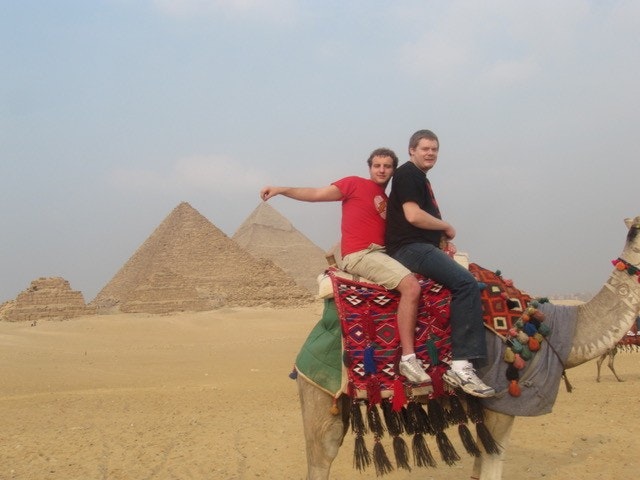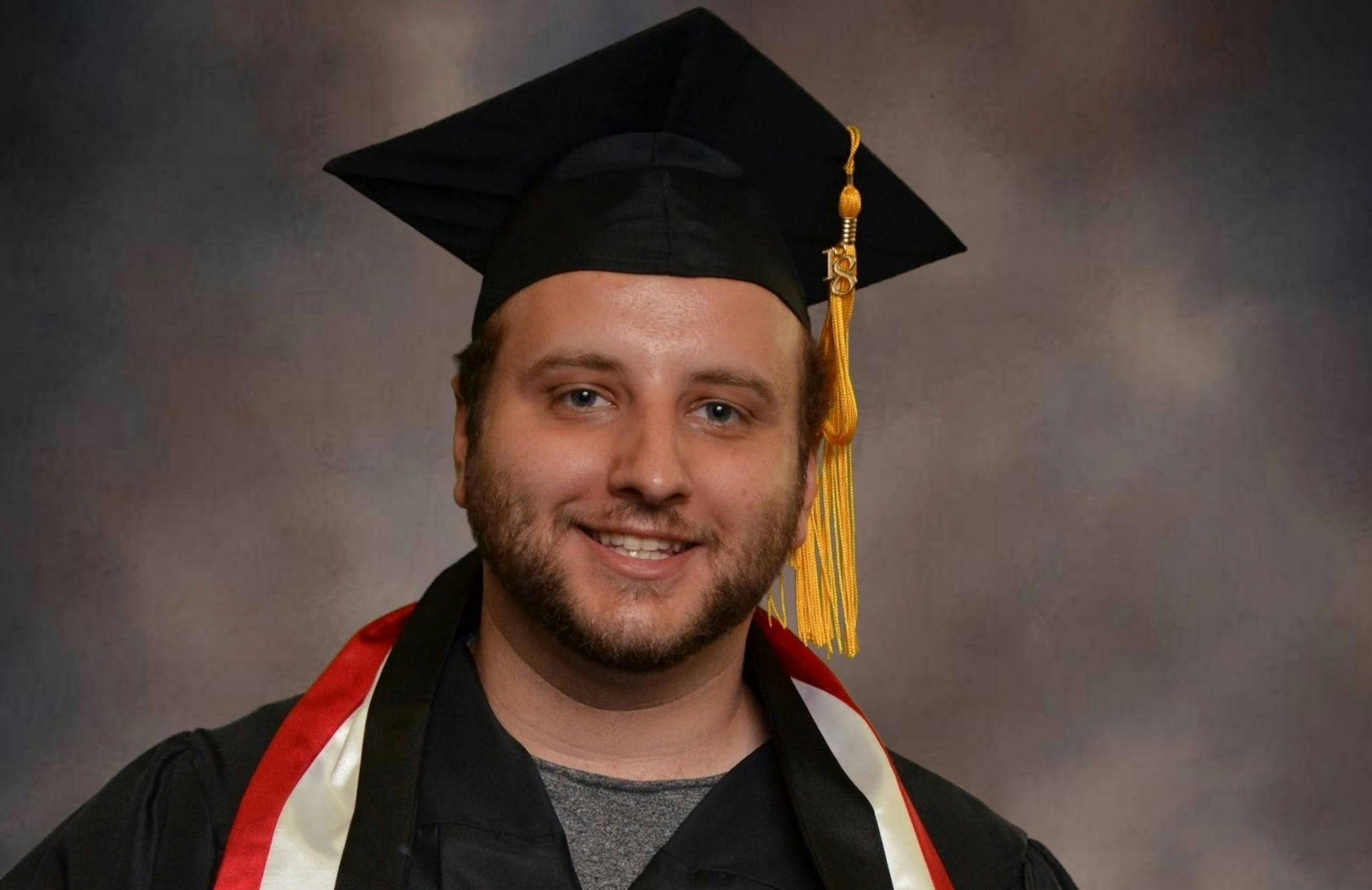Some 20 friends arrived at Luke Veenhuis’s funeral donning shorts and Hawaiian shirts, according to Veenhuis’s childhood friend Ben Braun, a testament to Veenhuis's laid-back personality and sense of humor. In high school, in the lab and throughout his life, Veenhuis uplifted those around him while being immensely committed to his passions.
“One thing that I have always genuinely admired about Luke was he was always unapologetically himself,” Braun said. “It didn’t matter if there was a social norm.”
After receiving his bachelor’s and master’s degrees in computer science at the University of Wisconsin-Whitewater, Veenhuis worked remotely as a researcher in engineering professor Eugene Santos’s lab at the Thayer School of Engineering, according to an email from College President Phil Hanlon. In the lab, Veenhuis researched a database system funded by the National Institutes of Health that guides doctors toward more effective treatments for patients.
Veenhuis died at age 30 on Sept. 26, 2022 at his home in Wisconsin, where he was working. According to Veenhuis’s mother Sue Veenhuis, his cause of death is still being determined but was related to complications from a blood clot.
Veenhuis is survived by his mother Sue, father Randy Veenhuis and two sisters, Madalyn and Emily.
“It was a shock,” said University of Wisconsin-Whitewater computer science professor Hien Nguyen, who served as Veenhuis’s advisor and worked closely with him for almost four years. Nguyen said that she oversees a tightly-knit research group that formed a core part of Veenhuis’s university experience.
“He developed a lot as a person,” she said. “He became very goal-oriented. For his master’s thesis, I think he worked 12 or 14 hours a day in the lab.”
In the introduction to Veenhuis’s master’s thesis, he wrote, “Most notably I thank my advisor, Hien Nguyen, for being patient when I was not.”

Veenhuis greets professors after defending his master's thesis at the University of Wisconsin-Whitewater. Photo courtesy of Sue Veenhuis.
All of Veenhuis’ friends and colleagues pointed out his intense work ethic in the lab, which developed later in life as he became more passionate about his burgeoning career in computer science. According to Sue Veenhuis, Luke was more of a “class clown” in his high school years in his hometown of Ft. Atkinson, Wisconsin.
“He was not a great student when he was young. He was a class clown and did not take his education very seriously until later in life,” she said, adding that after high school he was unsure of his path and worked in factories before beginning classes at a nearby junior college.
Braun, who said he knew Veenhuis since the two were five years old, echoed Sue’s description. In high school sports, Braun said Veenhuis’s goal was not to win, but to “have fun.” During a senior year tennis match, Braun said that Veenhuis jokingly wore a “matching ’90s jogger suit” and a cape to his game, which led to a serious conversation with the coach.
“Boiled down, Luke knew it was harmless and silly,” Braun said.
Veenhuis sometimes seemed to attract humor and irony like a magnet, according to his high school and college friend Roman Boparai.
“If something ironic were to happen, obviously it would happen to Luke,” Boparai said. “He was just always in the right place at the right time.”
Boparai said that one time, Veenhuis became hypnotized during an event with a high school hypnotist. But Veenhuis was actually in the crowd, not on stage with the other volunteers for the session, he added.
“Luke got hypnotized in the crowd and it was the funniest thing in the world,” Boparai said. “That explains his enigma: Nobody was surprised that he got hypnotized in the crowd.”
Veenhuis’ mother said that after her son’s passing she became more aware of his antics.
“I knew there were a lot of stories out there, and parents are always the last to know,” she joked. “He was just a really great kid.”

When their paths crossed again at University of Wisconsin-Whitewater, Boparai experienced a whole new Veenhuis, whom he described as the “workaholic Luke.” The two would sit together in Nguyen’s research lab spending late nights trying to navigate problems.
“Our discussions would almost get philosophical to a point and just became conjecture,” Boparai said. “We would go on a long tangent just talking about random stuff. I remember Luke was always pressured to want to succeed and be the best computer science research student that he could be.”
In the research group, both Nguyen and his teammates described Veenhuis as a critical team player, always willing to lend a helping hand to others. His Thayer colleague Gregory Hyde, a Ph.D. student in professor Santos’s lab — who also attended the University of Wisconsin-Whitewater with Veenhuis — said that Veenhuis pulled him out of his shell during their college years. In between the hard work, Hyde recalled warm memories of late nights in Nguyen’s lab fueled by energy drinks and games of Runescape, as well as fun nights out on the town.
“We were pretty competitive in academia and were constantly trying to one-up each other in a beneficial sense; it made us both better,” Hyde said. “He was instrumental for me being here [at Dartmouth].”
At Dartmouth, Hyde said that Veenhuis applied his “architectural mind” to data science in the lab, working on projects to help clinical researchers parse through biomedical data.
“Luke wore two hats, one as a software engineer, architecting out our [application programming interface] service, and another as a researcher, helping us organize and model our data,” Hyde wrote in a follow-up email. “Luke always had a mind for architecting out information systems.”
Sue Veenhuis said that she thinks her son would have gone on to pursue a doctorate and become a professor, guiding other students in computer science. She added that her family is in the process of organizing a scholarship in Veenhuis’s name at University of Wisconsin-Whitewater to help other students gain degrees in computer science.
Boparai said that Veenhuis left a positive impact on everyone around him during his life with his deep sense of compassion.
“You could tell that a lot of people cared about him because he was one of those guys that was just friends with hundreds of people,” he said. “I never met someone who did not like Luke. He just got along with everybody really well.”




